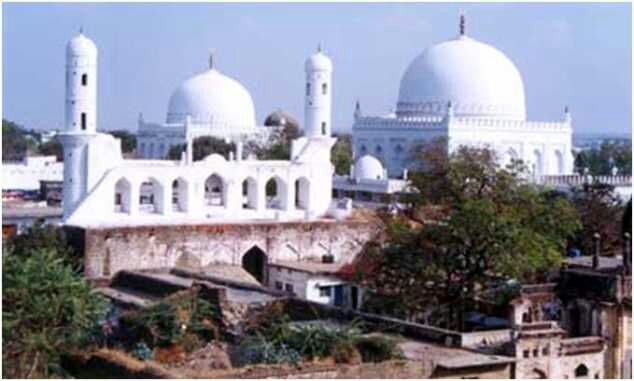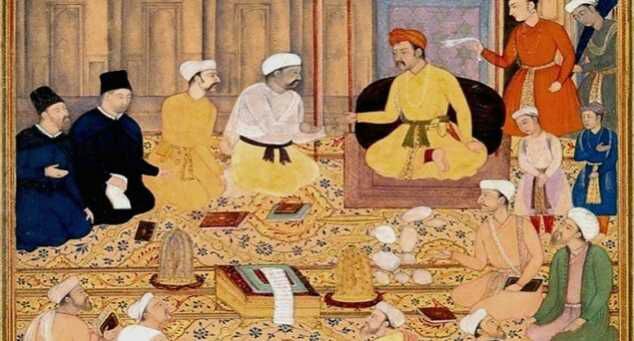Hazrat Khwaja Banda Nawaz Syed Muhammad Al-Hassani Al-Hussaini G
Hazrath Khwaja Bande Nawaz Khwaja Bande Nawaz was a famous Sufi Saint from India who advocated understanding, tolerance and harmony among various religious groups. Khwaja Bande Nawaz was born in Delhi in 1321. At the age of 4, his family shifted to Daulatabadin Maharashtra.
In 1397, he went to Gulbarga, Karnataka at the invitation of Sultan Feroz Shah Bahmani. Bande Nawaz authored about 130 books in Arabic, Persian and Urdu languages.Although he is popularly known as Hazrat Khwaja Bande NawazGesu Daraz, his real name was Syed Mohammed Hussaini. At the age of 15, he returned to Delhi and stayed for his education and training by the famous Sufi Saint Hazrat ChiragDehli, who bestowed him with his Khilafath and succession after about fifteen years.He was also a very enthusiastic student of Hazrat Kethli, Hazrat Tajuddin Bahadur and Qazi Abdul Muqtadir.
After teaching at various places such as Delhi, Mewath, Gwalior, Bhander, Aircha, Chatra, Chanderi, Miandhar, Baroda and Khambayat, he returned to teachat his base, Gulbarga, in 1397 and died in the year 1422.His Arabic language Tafseer of five Koranic sections (Juz) and explanations in margins are wellpreserved. Other books authored are: "Avarif-al-Mavarif","Fasoos-al-Hukm","Qaseeda Amali" and "Adaab-al-Mureedein".People from various walks of life, irrespective of caste and creed, assemble even today to celebrate the urs (which takes place on the 15th day of Zikhaida of Muslim calendar conducted in his name at the famous Bande Nawaz Darga in Gulbarga every year.The dargah of the enlightened Saint Hazrath Khwaja Bandanawaz Gesudaraz (Rh) lies in Gulbarga a district situated in the Deccan Plateau located in the northern Karnataka, India. The dargah encompasses of the mausoleum of a saint who taught love, amity and devotion. A saint who looked upon everyone else as equal and was never bias, where as he did not see who they were, what they wore, which language they spoke, or what beliefs they held.His masoluem continues to send out a message of spirituality, integrity, and harmony to this day.
It is a sanctuary where people from allwalks of life, irrespective of religion or sect, caste or creed, come to pay homage and find peace around them and within. Today, after six hundred years, the dargah of Gesudaraz strivesto maintain the atmosphere that his khanqah (monastery) was always knowned for.Dargah :
The word 'Dargah', in Persian, means a courtyard. As a technical term of Sufism, it implies a courtyard surrounding the shrine of a saint. This shrinemay or may not have a dome structure over it. The dargah of Gesudaraz has a huge dome structure over it.Like other Chishti monasteries, the khanqah (monastery) of Gesudaraz at Gulbarga is broad based. People from all backgrounds have always been welcomed and greeted with respect. Instances of the saint holding religious discussions with the yogis and brahmans are known, and his teachings had a tremendous impact on contemporary religious and social life.
He taught people to be particularly kind and affectionate towards each other.The hundreds who visit the dargah of Gesudaraz regularly on a daily basis and the hundreds of thousands who come during the Urs, meet in an atmosphere of amity and harmony, that is immaterial of the languages they speak and the rituals they perform. Driven by faith, the visitors are comforted with a solution, be it a peace of mind, cure for a sickness, or any other problem. And those who seek God, find Him here.
The dargah of Gesudaraz comprises of over 100 rooms for accomodation. These rooms are usually booked a month prior to the Urs, since people from all parts of India wish to attend this sacred event. These bookings are made through letters sent by postal mail requesting for a room and are addressed to the Sajjada Nasheen at the dargah address.URS : With regard to Prophet Yahya, Allah says "Peace Be Upon Him on the day he was born, and on the day he died and on the day he will be risen (here after)." (Quran, sura Maryam, v. 15)The Prophet Muhammad (PBUH) used to pay a visit each year at the shrines of the Martyrs of the war of Uhad. On the authority of the above, Urs iscelebrated once every year on the day Sufis Die Bismillah Hir Rahman Nir Raheem.Allahumma Salle "Ala Syedina Muhammadin Wa 'Ala Aalihi Syedina Muhammadin Wa BarikWa Sallim.Hazrat Khwaja Banda Nawaz Syed Muhammad Al-Hassani Al-Hussaini Gesu-Daraaz Buland Parvaaz Namudaan-e-Sarfaraaz ( Shahinshah-e-Daccan-ul-awliya ) ( Khwaja-e-Daccan)Qaddas Allahu Sirra ul AzeezHis name as well as patronymic was Abul-Fatah (RA) and Gesu Daraaz (RA) his title. Among thescholars and theologians he was Sheikh Abul-Fatah Sadr Uddin Muhammad Dehlavi but people called him Khawaja Banda Nawaz Gesu-Daraaz (RA).
ParentageHe was the descendant of Hazrat Ali ( Karam Allahu Wajhu). His forefathers resided in Hirat. One of them came to Delhiand settled down here. Hazrat Sheikh Muhammad (RA) was born here on 4, Rajab, 721 Hijri. His father Hazrat Syed Yousuf-bin-Ali alias Syed Raja (RA) wasa holy figure and devoted to Hazrat Nizam Uddin Aulia (RA).Sultan Muhammad-bin Tughlaq once transferred his capital to Daulatabad (Devgiri) and along with him went many scholars, theologians, and mystics. His parents also migrated to the place. He was four years at the time Malik-ul-Umar Hazrat Syed Ibrahim Mustafa, his maternal uncle, was the governor of Daulatabad.Childhood and Early EducationFrom the very beginning his father put him on the right track i.e. to learn and to study and gave him his early education. From his childhood he was inclined towards Religion and spent time in meditation and prayer. He was ten when his father died and his maternal grand father assumed the responsibility of his education and training and taught him initial books but he took lessonson "Misbah" and "Qadoori" from another teacher.Again in DelhiOn the expiry of her father his mother grew angry with her brother, and returned to Delhi.
He was fifteen at the time. He had heard a lot about Hazrat Nizam Uddin Auliya (RA) and Hazrat Nasir Uddin Roshan Chiragh Dehlavi (RA) from his father and maternal grand father and grew devoted to them. One day he went to say his prayer in the Jama-Majid of Sultan Qutub Uddin, there he saw Hazrat Sheikh Nasir Uddin Mahmud Chiragh Dehlavi and pledged Obedience to him on 16, Rajab.Completion of Outer and intrinsic studies.Under the guidance of Hazrat Nasir Uddin Chiragh Dehlavi (RA) he engaged himself in prayers and meditation and so much enjoyed them that lie forbade studies and requested his teacher to allow him to do so. Hazrat Nasir Uddin (RA) strictly denied him permission and instructed him to study withattention Usool-e-Bizoori, Risals Shamsia, Kashaf, Misbah so he restarted the studies under the guidance of renowned teachers. Maulana Syed Sheriff Uddin Kaithli, Maulana Taj Uddin Muqaddam and Maulana Qazi Abdul Muqtadir and qualified forthe degree at the age of nineteen.Title Gesu-Daraaz (RA)One day he with other disciples lifted the palanquin bearing Hazrat Nasir Uddin (RA).
His long hair stuck into the foot of the palki and pained him severely but he did not disentangle them for love and respect to the teacher. When Hazrat Nasir Uddin learnt of the episode, he was overjoyed and recited the Persian coupletHar ki murid Syed gesu daraaz shudVallah khilaf-e-nest ki Uoo ishq baaz shud.(Meaning: "Syed Gesu Daraazhas pledged his obedience; there is nothing wrong in it because he has deeply fallen in love)."After this incidence he was entitled Gesu-Daraaz (RA).Books He was a great scholar on material as well as spiritual subjects. He left many books. It is said, he was the first writer of a magazine on mysticism in Urdu. He wrote about 100 bookson Persian and Arabic. Some of them are:Tafseer (Commentary)-e-Qu'Orane-e-Majeed.Multaqit.Havashi Kashaf.Shairah-e-Mashareq.Shairah Fiqah-e-Akbar.Shairah Adab-Ul-Murideen.Shairah Ta-arruf.Risala Sirat-Ul-Nabi.Tarjuma Mashareq.Ma-Arif.Tarjuma Awarif.Sharah Fasoosul Hukm.Tarjuma Risala Qerya,Hawa Asahi Quwwat-Ul-Qalb, etc. etc.Stay at GulbargaHaving lived for about 44 years in Delhi he went to Gulbarga. Hewas eighthly at that time. Firoz Shah Bahmani ruled over the Deccan during this period. He gave him much respect. For a long time he was engaged in religious discourses, sermons, and spiritual training of the people.Wisal MubarakThis great scholar, mystic, and the wonderful, guide attained anage of 104 years, died on 16 Ziqa'ad 825 Hijri in Gulbarga and buried there. His tomb is a place of pilgrimage for all the people, high as well as low.Golden QuotesIf a Salik prays or meditates for fame, his is an atheist.If one prays or meditates out of fear, he is a cheat and a hypocrite.So long as a man disengages himself from all the worldly things, he would not step into the road of conduct.
Divide the night into three periods: in the first period say Darud and recitation; in the second sleep and in the third call His name and meditate.The Salik should be careful in food it should be legitimate.The Salik should abstain from the company of the worldly people.



Comments
Post a Comment